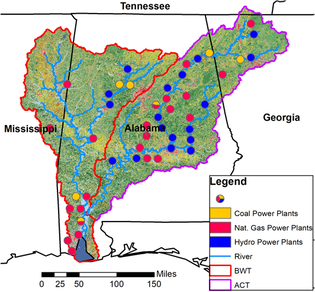Food-Energy-Water Nexus in the Deep South

Alabama experiences one of the highest poverty rates in the nation, and agricultural communities are particularly hard hit. Alabama has lost over 12 million acres of row crop agriculture since 1950 linked to improvements in cross-state transportation and investments in irrigation infrastructure in Midwestern and Western production regions. Despite receiving more than 1200 mm of precipitation annually, many agricultural regions in Alabama experience seasonal drought stress that reduces crop yields. Although irrigated acres are on the rise in Alabama, irrigated cropland represents less than 4% (188,970 irrigated acres in 2015) of the state’s total cropland (6,041,639 acres in 2017). Expansion of irrigated agriculture is a potential avenue for increasing agricultural productivity, farm revenue, and regional competitiveness of the state’s agricultural sector. However, there are numerous challenges to expanding irrigation including riparian rights only access to surface water, uncertain profitability, potential future regulations, and public perception of potential impacts on the environment. This project is investigating the food-energy-water (FEW) systems impacts of transitioning from rain-fed to irrigation-fed (RFtoIF) agriculture in Alabama. The study is being conducted in the Mobile River Basin encompassing portions of Alabama, Georgia and Mississippi. The overarching goal of this project is to develop a refined assessment of the feasibility of the RFtoIF transition and the potential rural economic benefits achievable within the FEW nexus in regions of the Deep South.
Research Team
Senior Personnel: Hamid Moradkhani (UA, PI), Mukesh Kumar (UA, co-I), Nicholas R. Magliocca (UA, co-I), Hamed Moftakhari (UA, co-I), Denis Nadolnyak (Auburn University, co-I)
Student Researchers: Ashleigh Price, Ruchie Pathak, Pratik Dhungana
Funding: National Science Foundation INFEWS 1856054 (2019-2023)
Presentations
Research Team
Senior Personnel: Hamid Moradkhani (UA, PI), Mukesh Kumar (UA, co-I), Nicholas R. Magliocca (UA, co-I), Hamed Moftakhari (UA, co-I), Denis Nadolnyak (Auburn University, co-I)
Student Researchers: Ashleigh Price, Ruchie Pathak, Pratik Dhungana
Funding: National Science Foundation INFEWS 1856054 (2019-2023)
Presentations
- Magliocca, N.R., Price, A.N., Kumar, M., Handyside, C., Guthrie, G. (2020). "Spatio-temporal patterns of irrigation adoption and water use in Alabama." Presented at the American Geophysical Union Fall Meeting 2020 (virtual). December 9, 2020.
- Magliocca, N.R. (2023). Intersecting security, equity, and sustainability for transformation in the Anthropocene. Anthropocene, 43, 100396: https://doi.org/10.1016/j.ancene.2023.100396
- Pathak, R., Magliocca, N. R. (2022). Assessing the Representativeness of Irrigation Adoption Studies: A Meta-Study of Global Research. Agriculture, 12(12), 2105. https://doi.org/10.3390/agriculture12122105.
- Schlüter, M., Caniglia, G., Orach, K., Bodin, Ö, Magliocca, N.R., Meyfroidt, P., Reyers. B. (2022). Why care about theories? Innovative ways of theorizing in sustainability science. Current Opinion in Environmental Sustainability, 54, 101154. https://www.sciencedirect.com/science/article/pii/S1877343522000069.
- Price, A., Pathak, R., Guthrie, G., Kumar, M., Moftakhari, H., Moradkhani, H., Nodalnyak, D. and Magliocca, N.R. (2022). Multi-Level Influences on Center-Pivot Irrigation Adoption in Alabama. Frontiers in Sustainable Food Systems. DOI: https://doi.org/10.3389/fsufs.2022.879161
- Magliocca, N.R., Jimenez, E.G. (2020). Costa Rica’s water paradox: Linking rainforests and droughts through the water-energy-food-environment nexus. Case Studies in the Environment, pp 1-9. DOI: https://doi.org/10.1525/cse/2019/002253.
- Magliocca, N.R. (2020). Agent-Based Modeling for Integrating Human Behavior into the Food–Energy–Water Nexus. Land, 9(12), 519; https://doi.org/10.3390/land9120519.
- Verburg, P. H., Alexander, P., Evans, T., Magliocca, N. R., Malek, Z., Rounsevell, M. D., & van Vliet, J. (2019). Beyond land cover change: towards a new generation of land use models. Current Opinion in Environmental Sustainability, 38, 77-85; https://doi.org/10.1016/j.cosust.2019.05.002.

